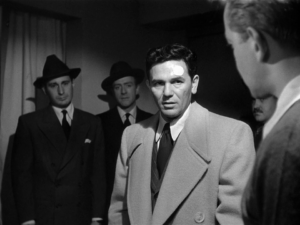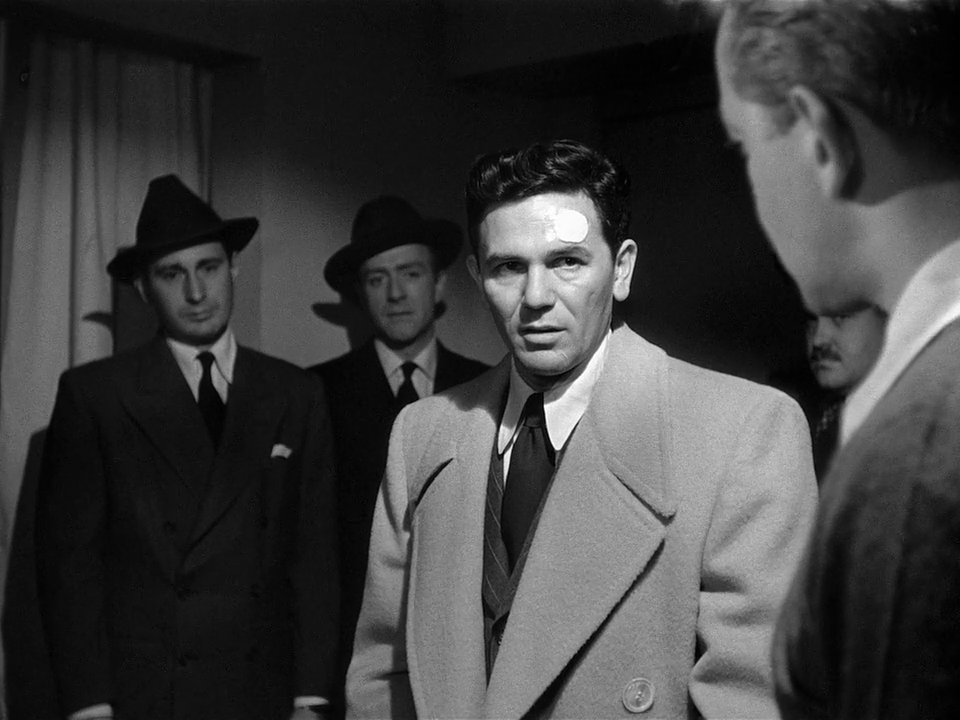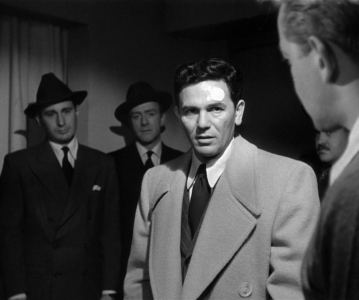Hank Kennedy discusses film noir’s relationship to the 1940s Hollywood Left and highlights two films of interest for socialist cinephiles.

November is often known by film buffs as “Noirvember,” the month being an opportunity to revisit classics from one of American film’s most singular and influential genres. Film noir has a strong relationship with the Hollywood Left. Looking just at the Blacklisted Hollywood Ten, screenwriter Albert Maltz penned the noir films This Gun for Hire and the Naked City and director Edward Dmytryk helmed the films Murder, My Sweet, Crossfire, Cornered, and Obsession. Another Blacklistee, Jules Dassin directed the noirs Brute Force and Night and the City. When Jacobin published an article on noir a few years ago, this writer was disappointed in the lack of attention paid to the creators behind the genre, particularly those on the political left. Art does not spontaneously generate from nothing. There were men and women with their own ideas, talents, and viewpoints that made these films possible.
One of them, “very dangerous citizen” Abraham Polonsky, worked on two films that would make an ideal double feature for leftist cinephiles this month. They are Body and Soul, written by Polonsky and directed by Robert Rossen (a Blacklistee who worked on the noirs Johnny O’Clock and The Strange Love of Martha Ivers) and Force of Evil, which Polonsky both wrote and directed. Both of these films indict greed, materialism, and the inhumanity of an economic system that puts profit above everything else. Both exhibit a concern for the struggle to maintain individual autonomy, a prevalent concern given the growing Cold War and crackdowns on civil liberties.
Both films star John Garfield, nicknamed “the Jewish Jimmy Cagney.” Garfield gives his protagonists a proletarian nature, the same kind that Cagney would have given them had he played them in the 1930s. In Body and Soul, he plays boxer Charley Davis who fights as a way out of the unemployment lines of the Great Depression. Davis is seduced by material excess as he becomes more successful . He pushes away his friends, his family, even his true love. All that is sacred becomes profaned.
The film also showcases the lack of concern for fighter’s health or lives felt by boxing promoters and managers. Canada Lee plays boxing champion Ben Chaplin who has been told by doctors that another bout in the ring could kill him. Chaplin, though, is in debt to promoter Roberts and is forced to fight. Roberts lies to Chaplin that the challenger, Davis, will take it easy and let the fight go to decision. Nothing of the sort happens, and Davis almost kills Chaplin in the ring. Although the film doesn’t make it explicit, it’s implied that part of the promoters callousness towards Chaplin is due to racism. They are white. He is Black.
A more obvious political issue in Body and Soul is the Jewish identity of its protagonist. During a scene where the Davis family applies for welfare, their religion is given as “Jewish.” This was at the same time that many Jewish actors and actresses (including Garfield, born Jacob Garfinkle) were “Americanizing” their names to be more acceptable to Gentile America. Later, a neighborhood supporter explains to Davis that Jews are betting on him as a way to stand up to the anti-Semitism being stirred up in Hitler’s Germany.
Although Body and Soul ends on a happy note, it is one tinged with uncertainty. Davis wins a fight that he was supposed to take a dive in. He regains the love of Lilli Palmer’s Peg. He defies Roberts boasting, “What are you gonna do? Kill me? Everybody dies.” But while Davis regains his integrity, the crooked world of boxing remains unchanged. At best, all Davis has done is damage Roberts’ pocketbook. Viewers don’t know if Roberts will eventually make good on Davis’ challenge and just kill him.
Polonsky followed up Body and Soul by directing Force of Evil. During production of the film, his phones were tapped. Agents listened in on a conversation between him and author Ira Wolfert, whose novel Tucker’s People served as basis for the film. Fitting the paranoid atmosphere of noir and the role wiretapping plays in the film, Polonsky and Wolfert “referred casually to what the federal agents likely listening to their conversation might think!”1
Joe Morse (Garfield) is a crooked lawyer working for a gangster attempting to monopolize the New York numbers racket and transform it into a legalized, legitimate state lottery. Morse assists Ben Tucker in his plot to fix the number for July 4th, bankrupt the other numbers banks, and then buy them out. However, Morse’s brother Leo is one of those who stands to lose everything and Morse struggles with his conscience over the course of the film.
Force of Evil establishes a direct link between crime and business. The film’s opening shot is of Wall Street, headquarters of America’s financial empires. The opening lines spoken by Joe: “This is Wall Street… and today was important because tomorrow – July Fourth – I intended to make my first million dollars. An exciting day in any man’s life.” A mobster reassures a skeptical participant in the racket by saying “What do you mean ‘gangsters’? It’s business.” Leo describes his previous failed real estate and garage businesses in criminal terms as well: “Real estate business… living from mortgage to mortgage… stealing credit like a thief. And the garage – that was a business! Three cents overcharge on every gallon of gas: two cents for the chauffeur and a penny for me. Penny for one thief, two cents for the other. Well, Joe’s here now – I won’t have to steal pennies anymore. I’ll have big crooks to steal dollars for me!” Has there been a better fictional explanation of the Marxist theory of profit?
Originally, Force of Evil was going to end on a dour note “with Joe’s recognition of his own moral disintegration” but Polonsky had to include a happy ending in order to win approval from the Motion Picture Production Code, the Hollywood censors.2 As it stands, the ending has Joe killing his boss and vowing to go to the District Attorney to expose the rackets. Like Body and Soul, there is an element of uncertainty to this seemingly happy ending. It was previously established that Tucker had the ear of powerful politicians. It’s unclear if the D.A. will be any different.
Harold Salemson, in the progressive National Guardian, didn’t think much of Force of Evil, writing in 1948, “John Garfield does his best, but this expose of the numbers racket falls down pretty badly in the writing and directing. For its good intentions, and nothing else, it is barely acceptable.” Salemson’s views aside, in the years since, appreciation for both films has grown. Norah Sayre wrote in 1982, “Few films were as radical as Body and Soul (written by Abraham Polonsky and directed by Robert Rossen) or Polonsky’s Force of Evil, which dissected the consequences of craving much more money than one needs-in a society that encourages the appetite for opulence. Before he was blacklisted, Polonsky wrote brilliantly pessimistic movies that were charged with sufficient violence to appeal to popular tastes, and they were concerned with working people-at a time when Hollywood concentrated on the middle class.”3
While Blacklisted, Abraham Polonsky wrote what many, including this writer, consider to be the final noir film of the classic period, Odds Against Tomorrow starring Robert Ryan, Ed Begley Sr., and Harry Belafonte. Polonsky’s ability to hide a message, in this case an anti-racist one, within a genre film was still readily apparent. He remained incensed by the Blacklist saying “after the blacklist, movies were almost labeled: Beware, do not enter this territory-the territory was social content.”4 He strongly opposed the Academy Award given to Elia Kazan, who not only named names but made the film On the Waterfront as an apology for informing. Polonsky declared that the only award Kazan should receive is the “Benedict Arnold Award.” One of the names Kazan listed was Art Smith, who played Charley’s father in Body and Soul.
John Garfield, a lifelong progressive, was pressed to name names as a way to help his foundering career. However, he refused to do so as a matter of principle, despite having never been a Communist Party member. Polonsky remembers. “He said he hated Communists, hated Communism, that he was an American. He told the Committee what they wanted to hear. But he wouldn’t say the one thing that would keep him from walking down his neighborhood block. Nobody could say ‘Here’s the fucking stool pigeon.’”5 When Garfield met with the FBI, his wife’s Communist Party membership card was presented and he was asked to sign a statement that his wife was a Communist. He angrily shouted “Fuck you!” and left. When he died at 39 of a long standing heart ailment, many blamed the added aggravation of HUAC’s investigation. The National Guardian memorialized Garfield and his Body and Soul costar Canada Lee in 1957 as victims of the Blacklist.
As established, the noir genre is unimaginable without the Hollywood Left. Two of the best political and artistic examples of this synthesis are worth the time of any film fan, socialist or not. The drive and conviction of their protagonists ought to inspire us as we fight our own battles for a better world. To paraphrase Charley: What can the capitalists do, kill us? Everybody dies.

- Paul Buhle & David Wagner Radical Hollywood: The Untold Story Behind America’s Favorite Movies (New York: New Press, 2002), 324.
- Peter Biskind Seeing is Believing: How Hollywood Taught us to Stop Worrying and Love the Fifties (New York: Pantheon Books, 1983), 196.
- Nora Sayre, Running Time: Films of the Cold War (New York: the Dial Press, 1982), 33.
- Ibid., 99.
- Victor S. Navsky, Naming Names (New York: Hill and Wang, 2003), xix.




